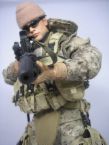 I work in a most hostile environment within a maximum security juvenile prison in Ohio. My environment is one in which I deal with over 300 violent aggressive youth ages 16 to 21 that have been convicted of crimes that would rival that of any adult institution. Officers within our fence are required to utilize force to accomplish institutional security and maintain order at least five times a day. On a bad day, I have seen reportable incidents of over six incidents per shift. After these incidents I often look back in confidence of my law enforcement career knowing that every use of force was not only justified, required, and most of all, within reason. Read more…
I work in a most hostile environment within a maximum security juvenile prison in Ohio. My environment is one in which I deal with over 300 violent aggressive youth ages 16 to 21 that have been convicted of crimes that would rival that of any adult institution. Officers within our fence are required to utilize force to accomplish institutional security and maintain order at least five times a day. On a bad day, I have seen reportable incidents of over six incidents per shift. After these incidents I often look back in confidence of my law enforcement career knowing that every use of force was not only justified, required, and most of all, within reason. Read more…
 Email This Post
Email This Post
 Print This Post
Print This Post
Tracy Barnhart Misconduct / Curruption, use of force
 You have just been involved in a stressful and violent situation. Your body has just had a major surge of adrenaline and other chemicals that will be coursing through your system for hours. Now it is time to set down and start writing what transpired. Depending on the severity of the incident will effect your recollection of the episode and the individual clarity will not come into focus for several hours after the violent situation. Read more…
You have just been involved in a stressful and violent situation. Your body has just had a major surge of adrenaline and other chemicals that will be coursing through your system for hours. Now it is time to set down and start writing what transpired. Depending on the severity of the incident will effect your recollection of the episode and the individual clarity will not come into focus for several hours after the violent situation. Read more…
 Email This Post
Email This Post
 Print This Post
Print This Post
Tracy Barnhart Mental Preperation, use of force
 When we speak about the “use of force,” I notice more and more that officers either need or want the green light to be given to them before they act. Correctional officers deep down have an intimate fear when it comes to the use of force of either reacting too soon, or too late resulting in injury of someone, or not at all. They have a natural ingrained fear of the criminals themselves, their administration not backing them for their actions or decisions as well as their peers not having their backs because of those very same reasons. They have terms thrown at them such as, “Reasonable,” “Excessive,” and “Liability,” with no clear cut explained definitions as well as no clear cut directions or leadership by the administrations. It is often said that it is easier to ask for forgiveness than to request permission, but in today’s litigious society this may be true, but painfully unforgiving on your career. Read more…
When we speak about the “use of force,” I notice more and more that officers either need or want the green light to be given to them before they act. Correctional officers deep down have an intimate fear when it comes to the use of force of either reacting too soon, or too late resulting in injury of someone, or not at all. They have a natural ingrained fear of the criminals themselves, their administration not backing them for their actions or decisions as well as their peers not having their backs because of those very same reasons. They have terms thrown at them such as, “Reasonable,” “Excessive,” and “Liability,” with no clear cut explained definitions as well as no clear cut directions or leadership by the administrations. It is often said that it is easier to ask for forgiveness than to request permission, but in today’s litigious society this may be true, but painfully unforgiving on your career. Read more…
 Email This Post
Email This Post
 Print This Post
Print This Post
Tracy Barnhart Mental Preperation, use of force
 In June 1943, racial tension was close to the boiling point in Detroit, Michigan. Following a race-related fight at an amusement park, false rumors whipped both blacks and whites into a murderous rage. In the black community, the word was that some white men had thrown a black woman who was holding a baby into a lake. Whites repeated news that a mob of blacks had assaulted a white woman. Read more…
In June 1943, racial tension was close to the boiling point in Detroit, Michigan. Following a race-related fight at an amusement park, false rumors whipped both blacks and whites into a murderous rage. In the black community, the word was that some white men had thrown a black woman who was holding a baby into a lake. Whites repeated news that a mob of blacks had assaulted a white woman. Read more…
 Email This Post
Email This Post
 Print This Post
Print This Post
Tracy Barnhart Mental Preperation, use of force culture, death, mob mentality, riots, terrorism, turbuculosis
 One of the most significant things you can do to communicate effectively is what is called Active Listening. Some people say the fact that a person has two ears and one mouth illustrates that you should hear twice as much as you speak. One of the foundational keys to good listening is that the listener’s body language should demonstrate interest. Interest is communicated by facing the person, having good eye contact, responding with facial expressions and head nodding. The speaker will be able to see that you are listening and interested in what they are saying. We will review some of the principals, which will assist in sharpening your listening skills. Read more…
One of the most significant things you can do to communicate effectively is what is called Active Listening. Some people say the fact that a person has two ears and one mouth illustrates that you should hear twice as much as you speak. One of the foundational keys to good listening is that the listener’s body language should demonstrate interest. Interest is communicated by facing the person, having good eye contact, responding with facial expressions and head nodding. The speaker will be able to see that you are listening and interested in what they are saying. We will review some of the principals, which will assist in sharpening your listening skills. Read more…
 Email This Post
Email This Post
 Print This Post
Print This Post
Tracy Barnhart Mental Preperation Add new tag, control, culture, federal, mob mentality, riots, security
Dedicated to Juvenile Correctional Officer William Hesson
End of Watch: April 29th, 2009
Cause of Death: Inmate assault
 Everyone who knows me best knows that I am big on the warrior ethos and obtaining and keeping a survival mindset. But in writing this training article I was very apprehensive on what to call it. I wanted to call it, “The Survival Mindset” but in doing so it would have indicated that we are in a survival fight for our lives with extreme peril and most administrators would have disregarded it as not applicable. I thought about calling it “The Warrior Mindset” but that would have given us a wrong public misconception that we are bloodthirsty combative killers, not good for appearances. So I sat and thought about this article and came up with a great administratively PC correct title that seemed virtually calming and non-aggressive and above all, totally crap. Read more…
Everyone who knows me best knows that I am big on the warrior ethos and obtaining and keeping a survival mindset. But in writing this training article I was very apprehensive on what to call it. I wanted to call it, “The Survival Mindset” but in doing so it would have indicated that we are in a survival fight for our lives with extreme peril and most administrators would have disregarded it as not applicable. I thought about calling it “The Warrior Mindset” but that would have given us a wrong public misconception that we are bloodthirsty combative killers, not good for appearances. So I sat and thought about this article and came up with a great administratively PC correct title that seemed virtually calming and non-aggressive and above all, totally crap. Read more…
 Email This Post
Email This Post
 Print This Post
Print This Post
Tracy Barnhart Mental Preperation, use of force control, culture, riots, security, terrorism
 I have been asked to write some information that presents to rookie officers that may not have been in the books or trained in the academy. This put a big smile on my face as that specific purpose has been my main mission for the past two years. I write specifically to officers who are still working in the field as, I am. I understand their plight and constant need for good purposeful training that may not be there or available. Not training that mirrors your policy. Policy training spends a lot of time telling you what not to do but never informs you should do and what you should be doing. This aspect is left up to chance. The chance you may make probation or the chance you may quit after your first week. Read more…
I have been asked to write some information that presents to rookie officers that may not have been in the books or trained in the academy. This put a big smile on my face as that specific purpose has been my main mission for the past two years. I write specifically to officers who are still working in the field as, I am. I understand their plight and constant need for good purposeful training that may not be there or available. Not training that mirrors your policy. Policy training spends a lot of time telling you what not to do but never informs you should do and what you should be doing. This aspect is left up to chance. The chance you may make probation or the chance you may quit after your first week. Read more…
 Email This Post
Email This Post
 Print This Post
Print This Post
Tracy Barnhart Mental Preperation
 When I refer to the Hold Them and Fold Them analogy what I am talking about is knowing when its time either to engage or disengage physically from a potentially assaultive inmate. I responded to a call for assistance a few weeks ago and I observed an officer attempting to verbally de-escalate an inmate who was visible angry and violent. The officer made several mistakes in the de-escalation process but was incredibly determined to talk the inmate down without the need to use physical intervention. So determined, in fact, that he continued verbalization even after the inmate assaulted him and struck the officer in the side of the head. Read more…
When I refer to the Hold Them and Fold Them analogy what I am talking about is knowing when its time either to engage or disengage physically from a potentially assaultive inmate. I responded to a call for assistance a few weeks ago and I observed an officer attempting to verbally de-escalate an inmate who was visible angry and violent. The officer made several mistakes in the de-escalation process but was incredibly determined to talk the inmate down without the need to use physical intervention. So determined, in fact, that he continued verbalization even after the inmate assaulted him and struck the officer in the side of the head. Read more…
 Email This Post
Email This Post
 Print This Post
Print This Post
Tracy Barnhart use of force
 The use of force as it pertains to corrections and law enforcement is a cloudy and unfortunately not a well defined animal. I don’t understand why the use of force is not trained more throughout the country on the fundamentals, legal allowances and court cases regarding the use of force and less on the administrative strategies of what not to do. “The military trains and trains and trains and rarely fights, whereas correctional officers fight and fight and fight, but rarely train.” There are a few theories that “try” to explain why most correctional officers do not train with the same integrity and intensity as their military cousins. The only one in my opinion that cannot truly be accepted is that budget and time restraints make it difficult. This particular officer initiated action is probably the most feared and controversial and has put more officers on the street and into the jail cells that they as correctional officers patrol everyday. In my opinion I believe that officers are more afraid of being sued than they are of being assaulted while on duty. Read more…
The use of force as it pertains to corrections and law enforcement is a cloudy and unfortunately not a well defined animal. I don’t understand why the use of force is not trained more throughout the country on the fundamentals, legal allowances and court cases regarding the use of force and less on the administrative strategies of what not to do. “The military trains and trains and trains and rarely fights, whereas correctional officers fight and fight and fight, but rarely train.” There are a few theories that “try” to explain why most correctional officers do not train with the same integrity and intensity as their military cousins. The only one in my opinion that cannot truly be accepted is that budget and time restraints make it difficult. This particular officer initiated action is probably the most feared and controversial and has put more officers on the street and into the jail cells that they as correctional officers patrol everyday. In my opinion I believe that officers are more afraid of being sued than they are of being assaulted while on duty. Read more…
 Email This Post
Email This Post
 Print This Post
Print This Post
Tracy Barnhart use of force
 I have been asked to do a third part in this special use of force segment training articles. There is one topic that I enjoy more than no other to talk about, and that is the use of force. In this article specifically, I was asked about techniques to utilize so officers can use that actually work during restraints. My answer is that no technique that I could ever write about in a training article or that can be learned from reading this and then applied correctly. I can however, give you some basic principals that you can take away and seek out a good martial arts program in order to gain further knowledge. Read more…
I have been asked to do a third part in this special use of force segment training articles. There is one topic that I enjoy more than no other to talk about, and that is the use of force. In this article specifically, I was asked about techniques to utilize so officers can use that actually work during restraints. My answer is that no technique that I could ever write about in a training article or that can be learned from reading this and then applied correctly. I can however, give you some basic principals that you can take away and seek out a good martial arts program in order to gain further knowledge. Read more…
 Email This Post
Email This Post
 Print This Post
Print This Post
Tracy Barnhart Mental Preperation
 I work in a most hostile environment within a maximum security juvenile prison in Ohio. My environment is one in which I deal with over 300 violent aggressive youth ages 16 to 21 that have been convicted of crimes that would rival that of any adult institution. Officers within our fence are required to utilize force to accomplish institutional security and maintain order at least five times a day. On a bad day, I have seen reportable incidents of over six incidents per shift. After these incidents I often look back in confidence of my law enforcement career knowing that every use of force was not only justified, required, and most of all, within reason. Read more…
I work in a most hostile environment within a maximum security juvenile prison in Ohio. My environment is one in which I deal with over 300 violent aggressive youth ages 16 to 21 that have been convicted of crimes that would rival that of any adult institution. Officers within our fence are required to utilize force to accomplish institutional security and maintain order at least five times a day. On a bad day, I have seen reportable incidents of over six incidents per shift. After these incidents I often look back in confidence of my law enforcement career knowing that every use of force was not only justified, required, and most of all, within reason. Read more… Email This Post
Email This Post
 Print This Post
Print This Post


 You have just been involved in a stressful and violent situation. Your body has just had a major surge of adrenaline and other chemicals that will be coursing through your system for hours. Now it is time to set down and start writing what transpired. Depending on the severity of the incident will effect your recollection of the episode and the individual clarity will not come into focus for several hours after the violent situation.
You have just been involved in a stressful and violent situation. Your body has just had a major surge of adrenaline and other chemicals that will be coursing through your system for hours. Now it is time to set down and start writing what transpired. Depending on the severity of the incident will effect your recollection of the episode and the individual clarity will not come into focus for several hours after the violent situation.  When we speak about the “use of force,” I notice more and more that officers either need or want the green light to be given to them before they act. Correctional officers deep down have an intimate fear when it comes to the use of force of either reacting too soon, or too late resulting in injury of someone, or not at all. They have a natural ingrained fear of the criminals themselves, their administration not backing them for their actions or decisions as well as their peers not having their backs because of those very same reasons. They have terms thrown at them such as, “Reasonable,” “Excessive,” and “Liability,” with no clear cut explained definitions as well as no clear cut directions or leadership by the administrations. It is often said that it is easier to ask for forgiveness than to request permission, but in today’s litigious society this may be true, but painfully unforgiving on your career.
When we speak about the “use of force,” I notice more and more that officers either need or want the green light to be given to them before they act. Correctional officers deep down have an intimate fear when it comes to the use of force of either reacting too soon, or too late resulting in injury of someone, or not at all. They have a natural ingrained fear of the criminals themselves, their administration not backing them for their actions or decisions as well as their peers not having their backs because of those very same reasons. They have terms thrown at them such as, “Reasonable,” “Excessive,” and “Liability,” with no clear cut explained definitions as well as no clear cut directions or leadership by the administrations. It is often said that it is easier to ask for forgiveness than to request permission, but in today’s litigious society this may be true, but painfully unforgiving on your career.  In June 1943, racial tension was close to the boiling point in Detroit, Michigan. Following a race-related fight at an amusement park, false rumors whipped both blacks and whites into a murderous rage. In the black community, the word was that some white men had thrown a black woman who was holding a baby into a lake. Whites repeated news that a mob of blacks had assaulted a white woman.
In June 1943, racial tension was close to the boiling point in Detroit, Michigan. Following a race-related fight at an amusement park, false rumors whipped both blacks and whites into a murderous rage. In the black community, the word was that some white men had thrown a black woman who was holding a baby into a lake. Whites repeated news that a mob of blacks had assaulted a white woman.  One of the most significant things you can do to communicate effectively is what is called Active Listening. Some people say the fact that a person has two ears and one mouth illustrates that you should hear twice as much as you speak. One of the foundational keys to good listening is that the listener’s body language should demonstrate interest. Interest is communicated by facing the person, having good eye contact, responding with facial expressions and head nodding. The speaker will be able to see that you are listening and interested in what they are saying. We will review some of the principals, which will assist in sharpening your listening skills.
One of the most significant things you can do to communicate effectively is what is called Active Listening. Some people say the fact that a person has two ears and one mouth illustrates that you should hear twice as much as you speak. One of the foundational keys to good listening is that the listener’s body language should demonstrate interest. Interest is communicated by facing the person, having good eye contact, responding with facial expressions and head nodding. The speaker will be able to see that you are listening and interested in what they are saying. We will review some of the principals, which will assist in sharpening your listening skills.  Everyone who knows me best knows that I am big on the warrior ethos and obtaining and keeping a survival mindset. But in writing this training article I was very apprehensive on what to call it. I wanted to call it, “The Survival Mindset” but in doing so it would have indicated that we are in a survival fight for our lives with extreme peril and most administrators would have disregarded it as not applicable. I thought about calling it “The Warrior Mindset” but that would have given us a wrong public misconception that we are bloodthirsty combative killers, not good for appearances. So I sat and thought about this article and came up with a great administratively PC correct title that seemed virtually calming and non-aggressive and above all, totally crap.
Everyone who knows me best knows that I am big on the warrior ethos and obtaining and keeping a survival mindset. But in writing this training article I was very apprehensive on what to call it. I wanted to call it, “The Survival Mindset” but in doing so it would have indicated that we are in a survival fight for our lives with extreme peril and most administrators would have disregarded it as not applicable. I thought about calling it “The Warrior Mindset” but that would have given us a wrong public misconception that we are bloodthirsty combative killers, not good for appearances. So I sat and thought about this article and came up with a great administratively PC correct title that seemed virtually calming and non-aggressive and above all, totally crap.  I have been asked to write some information that presents to rookie officers that may not have been in the books or trained in the academy. This put a big smile on my face as that specific purpose has been my main mission for the past two years. I write specifically to officers who are still working in the field as, I am. I understand their plight and constant need for good purposeful training that may not be there or available. Not training that mirrors your policy. Policy training spends a lot of time telling you what not to do but never informs you should do and what you should be doing. This aspect is left up to chance. The chance you may make probation or the chance you may quit after your first week.
I have been asked to write some information that presents to rookie officers that may not have been in the books or trained in the academy. This put a big smile on my face as that specific purpose has been my main mission for the past two years. I write specifically to officers who are still working in the field as, I am. I understand their plight and constant need for good purposeful training that may not be there or available. Not training that mirrors your policy. Policy training spends a lot of time telling you what not to do but never informs you should do and what you should be doing. This aspect is left up to chance. The chance you may make probation or the chance you may quit after your first week.  When I refer to the Hold Them and Fold Them analogy what I am talking about is knowing when its time either to engage or disengage physically from a potentially assaultive inmate. I responded to a call for assistance a few weeks ago and I observed an officer attempting to verbally de-escalate an inmate who was visible angry and violent. The officer made several mistakes in the de-escalation process but was incredibly determined to talk the inmate down without the need to use physical intervention. So determined, in fact, that he continued verbalization even after the inmate assaulted him and struck the officer in the side of the head.
When I refer to the Hold Them and Fold Them analogy what I am talking about is knowing when its time either to engage or disengage physically from a potentially assaultive inmate. I responded to a call for assistance a few weeks ago and I observed an officer attempting to verbally de-escalate an inmate who was visible angry and violent. The officer made several mistakes in the de-escalation process but was incredibly determined to talk the inmate down without the need to use physical intervention. So determined, in fact, that he continued verbalization even after the inmate assaulted him and struck the officer in the side of the head.  The use of force as it pertains to corrections and law enforcement is a cloudy and unfortunately not a well defined animal. I don’t understand why the use of force is not trained more throughout the country on the fundamentals, legal allowances and court cases regarding the use of force and less on the administrative strategies of what not to do. “The military trains and trains and trains and rarely fights, whereas correctional officers fight and fight and fight, but rarely train.” There are a few theories that “try” to explain why most correctional officers do not train with the same integrity and intensity as their military cousins. The only one in my opinion that cannot truly be accepted is that budget and time restraints make it difficult. This particular officer initiated action is probably the most feared and controversial and has put more officers on the street and into the jail cells that they as correctional officers patrol everyday. In my opinion I believe that officers are more afraid of being sued than they are of being assaulted while on duty.
The use of force as it pertains to corrections and law enforcement is a cloudy and unfortunately not a well defined animal. I don’t understand why the use of force is not trained more throughout the country on the fundamentals, legal allowances and court cases regarding the use of force and less on the administrative strategies of what not to do. “The military trains and trains and trains and rarely fights, whereas correctional officers fight and fight and fight, but rarely train.” There are a few theories that “try” to explain why most correctional officers do not train with the same integrity and intensity as their military cousins. The only one in my opinion that cannot truly be accepted is that budget and time restraints make it difficult. This particular officer initiated action is probably the most feared and controversial and has put more officers on the street and into the jail cells that they as correctional officers patrol everyday. In my opinion I believe that officers are more afraid of being sued than they are of being assaulted while on duty.  I have been asked to do a third part in this special use of force segment training articles. There is one topic that I enjoy more than no other to talk about, and that is the use of force. In this article specifically, I was asked about techniques to utilize so officers can use that actually work during restraints. My answer is that no technique that I could ever write about in a training article or that can be learned from reading this and then applied correctly. I can however, give you some basic principals that you can take away and seek out a good martial arts program in order to gain further knowledge.
I have been asked to do a third part in this special use of force segment training articles. There is one topic that I enjoy more than no other to talk about, and that is the use of force. In this article specifically, I was asked about techniques to utilize so officers can use that actually work during restraints. My answer is that no technique that I could ever write about in a training article or that can be learned from reading this and then applied correctly. I can however, give you some basic principals that you can take away and seek out a good martial arts program in order to gain further knowledge.